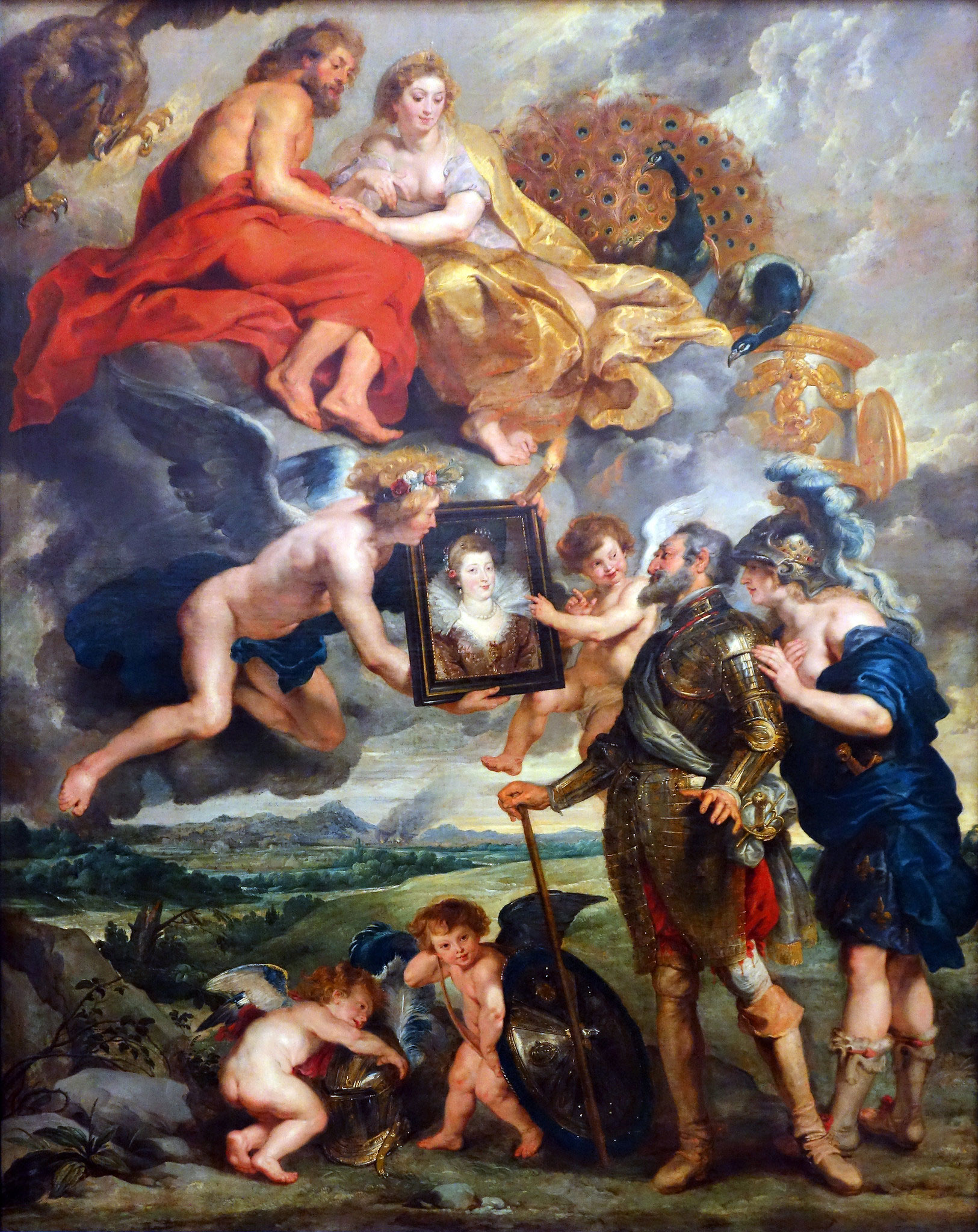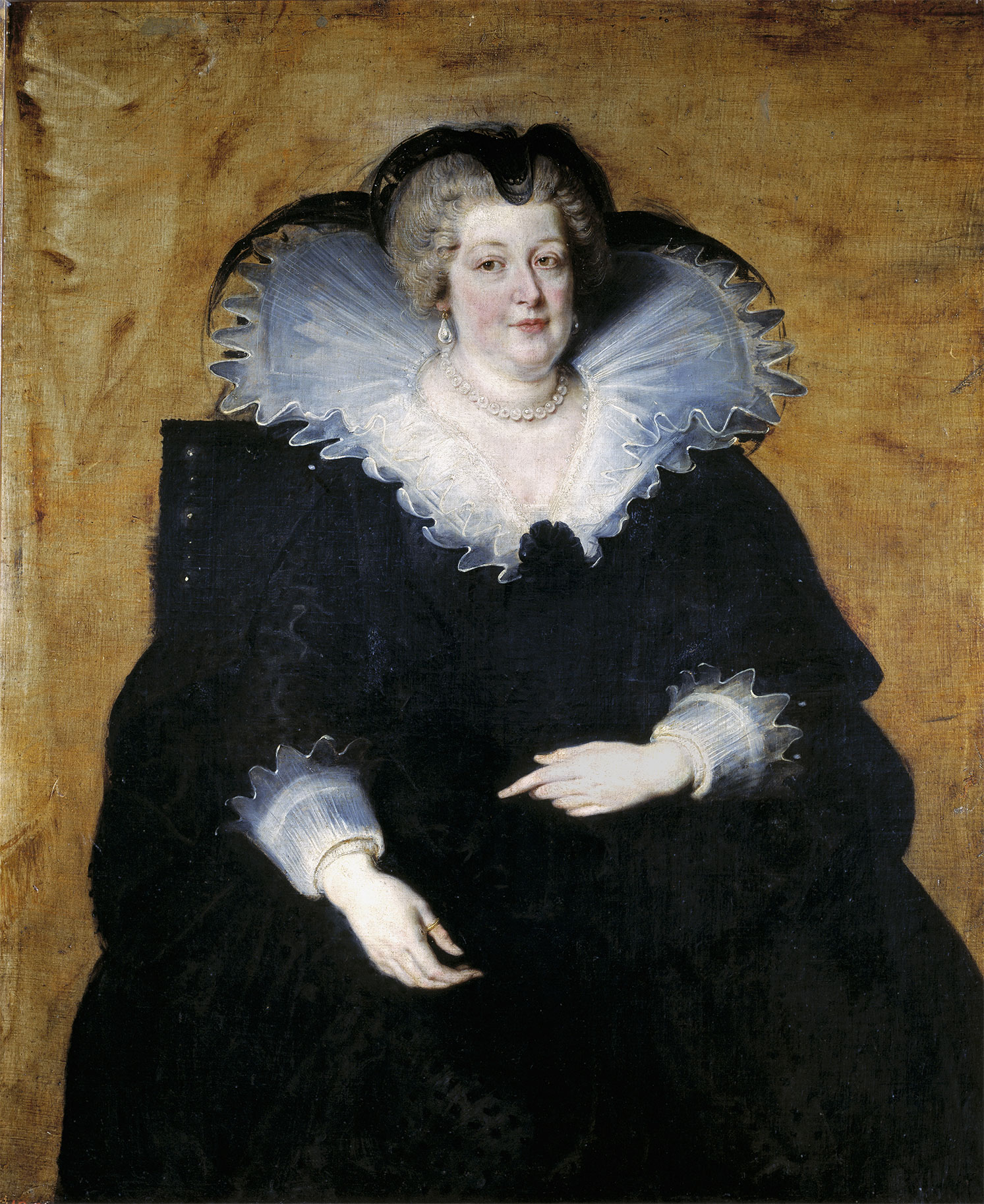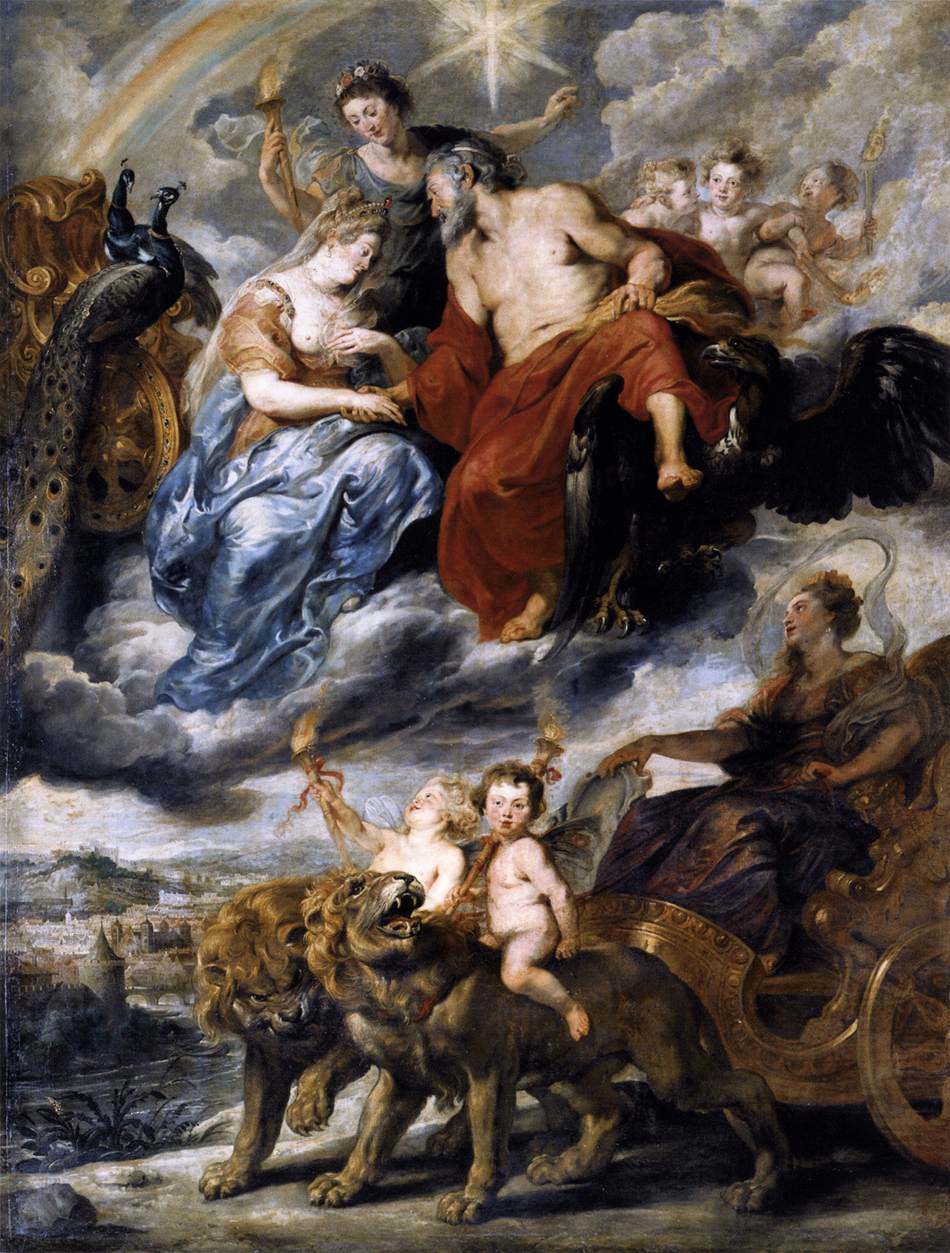 |
 |
THE LIFE OF
1575 - 1642
Queen of
France
CONSORT OF
HENRI IV,
AND REGENT OF
THE KINGDOM UNDER LOUIS XIII
By
JULIA PARDOE
CHAPTER I.
1572-99
CHAPTER I.
1610
CHAPTER I.
1618
CHAPTER
IX. 1632
PREFACE TO THE FIRST EDITION
All the
existing records of European royalty do not, probably, comprise the annals of a
life of greater vicissitude than that which has been chosen as the subject of
the present work. We find numerous examples in history of Queens who have
suffered exile, imprisonment, and death; but we believe that the unfortunate
Marie de Medicis is the only authenticated instance
of a total abandonment on the part alike of her family and friends, which
terminated almost in starvation. Certain it is that after having occupied the
throne of France, presided over its Councils, and given birth to the ancestor
of a long line of Princes, she was ultimately indebted to the sympathy and
attachment of a foreign artist, of whom she had once been the zealous patron,
for a roof under which to terminate her miserable existence! The whole life of
this ill-fated Queen is, indeed, full of startling contrasts from which the
mind shrinks back appalled; and her entire career is so freighted with
alternate grandeur and privation that it is difficult to reconcile the
possibility of their having fallen to the share of the same individual; and
this too in an age when France, above all other nations, boasted of its
chivalry, and when some of the greatest names that have ever figured in its
annals gave grace and glory to its history.
The
times were, moreover, as remarkable as the men by whom they were illustrated;
for despite the civil and foreign wars by which they were so unhappily
distinguished, the arts flourished, and the spread of political liberty became
apparent; although it is equally certain that they were at the same time fatal
alike to the aristocracy and to the magistrature; and that they rapidly paved
the way to the absolutism of Louis XIV, to the shameless saturnalia of the
Regency, and to the dishonouring and degrading excesses of Louis XV, who may
justly be said to have prepared by his licentiousness the scaffold of his
successor.
During
several centuries the French monarchs had indulged in a blind egotism, which
rendered them unable to appreciate the effects of their own errors upon their
subjects. L'ÉTAT C'EST MOI had unfortunately been practically their ruling
principle long ere Louis XIV ventured to put it into words. To them the Court
was the universe, the aristocracy the nation, and the Church the corner-stone
of the proud altar upon which they had enthroned themselves, and beyond which
they cared not either to look or listen. A fatal mistake fatally expiated! Yet,
as we have already remarked, the system, dangerous and hollow as it was,
endured for centuries--endured until crime was heaped on crime, and the fearful
holocaust towered towards Heaven as if to appeal for vengeance. And that
vengeance came! It had been long delayed; so long indeed that when the
brilliant courtiers of Versailles were told of disaffection among the masses,
and warned to conciliate ere it was too late the goodwill of their inferiors,
they listened with contemptuous carelessness to the tardy caution, and scorned
to place themselves in competition with those untitled classes whom they had
long ceased to regard as their fellow-men. But the voice of the people is like
the stroke of the hammer upon the anvil; it not only makes itself heard, but,
however great may be the original resistance, finishes by fashioning the metal
upon which it falls after its own will.
During
the reign of Louis XIII this great and fatal truth had not yet been impressed
upon the French nation, for the popular voice was stifled beneath the ukase of
despotism; and even the tiers-état--important
as the loyalty of that portion of a kingdom must ever be to its rulers--were treated
with disdain and contumely; but beneath all the workings of his government (or
rather the government of his minister, for the son of Marie de Medicis was a monarch only in name), may be traced the
undercurrent of popular indignation and discontent, which, gradually swelling
and rising during the two succeeding reigns, finally overthrew with its giant
waves the last frail barrier which still upreared itself before a time-honoured
throne.
The
incapacity of the King, the venality of the Princes, the arrogance of the
hierarchy, the insubordination of the nobles, the licentiousness of the Court,
the despotism of the Government; all the errors and all the vices of their
rulers, were jealously noted and bitterly registered by an oppressed and
indignant people; but it required time to shake off a yoke which had been so
long borne that it had eaten into the flesh; nor, moreover, were the minds of
the masses in that age sufficiently awakened to a sense of their own collective
power to enable them, as they did in the following century, to measure their
strength with those upon whom they had been so long accustomed to look with
fear and awe.
There
cannot, moreover, exist the slightest doubt that the wantonness with which
Richelieu, in furtherance of his own private interests, poured out so freely on
the scaffold some of the proudest blood of France, did much towards destroying
that prestige which had hitherto environed the high nobility. When Biron
perished upon the block, although his death was decreed by the sovereign, and
that sovereign, moreover, was their own idolized Henri IV, the people marvelled
and even murmured; but in after-years they learned through the teaching of the
Cardinal that nobles were merely men; while the exile of the persecuted Marie
de Medicis, and the privations to which she was
exposed through his agency, taught them that even royalty itself was not
invulnerable to the malice or vengeance of its opponents; and unhappily for
those by whom Richelieu was succeeded in power, the lesson brought forth its
fruits in due season.
Thus
much premised, I shall confine myself to a brief explanation of the manner in
which I have endeavoured to perform my self-imposed task. For one wilful, but
as I trust excusable, inaccuracy, I throw myself on the indulgence of my
critics. Finding my pages already overloaded with names, and that they must
consequently induce a considerable strain upon the memory of such readers as
might not chance to be intimately acquainted with the domestic history of the
period under consideration, I have, from the commencement of the work,
designated the Duc de Sully by the title which he ultimately attained, and by
which he is universally known, rather than confuse the mind of my readers by
allusions to M. de Béthune, M. de Rosny, and finally
M. de Sully, when each and all merely signified the same individual; and I feel
persuaded that this arrangement will be generally regarded as a judicious one,
inasmuch as it tends to lessen a difficulty already sufficiently great; a fact
which will be at once apparent on reference to the biographical table at the
head of each volume.
On the
other hand I have, contrary to my previous system, but in justice to myself,
carefully, and even perhaps somewhat elaborately, multiplied the footnotes, in
order to give with precision the several authorities whence I deduced my facts;
and I must be excused should this caution appear uselessly tedious or pedantic
to the general reader, as I am anxious on this occasion to escape the
accusation which was once brought against me when it was equally undeserved, of
having “quoted at second-hand”, and even drawn my materials from “historical
romances of the time”. It is, of course, easy to make assertions of this nature
at random; but when a writer feels that he or she has conscientiously performed
a duty voluntarily undertaken, it is painful to be misjudged; especially when,
as in the present instance, nearly three years have been devoted to the work.
For the
facsimile letters by which my volumes are enriched I am indebted to the
kindness of M. de la Plane, a member of the Institut Royal de France, of whose extensive and valuable cabinet of ancient records
they now form a part; and by whom their publication was obligingly authorized.
The authenticity of these letters admits of no doubt, as it is known that they
originally formed a portion of the rich collection of autographs in the
possession of the Maréchal de Bassompierre, to whom
they were severally addressed; and that at his death they were transferred to
the library of the Fathers of the Oratory at St. Magloire in Paris; whence (it
is believed at the Revolution) they fell into the hands of a member of that
celebrated society, Le Père de Mevolhon, formerly
Canon and Vicar-General of the diocese of St. Omer, by whom they were presented
to M. de la Plane.
At the
time when he so kindly entrusted to me the letters above named, the same
obliging friend also confided to my care, with full permission to make whatever
use of it I should see fit, an unpublished MS. consisting of nearly twelve
thousand pages closely written, and divided into twenty-four volumes small
quarto, all undeniably the work of one hand. This elaborate MS. was entitled “Memoirs
of M. le Commandeur de Rambure,
Captain of the regiment of French Guards, Gentleman of the Bedchamber under the
Kings Henri IV, Louis XIII, and Louis XIV surnamed the Great, with all the most
memorable events which took place during the reigns of those three Majesties,
from the year 1594 to that of 1660”.
The
author of this voluminous MS., who, at the age of eighty-one, inscribes his
work to his uncle, Monseigneur de Rambure,
Bishop of Vannes, and who professes to have ventured thus tardily upon his
Herculean undertaking at the request, and for the instruction, of his nephew
the Marquis de Rambure, lays strict injunctions upon
his successors to keep the record of his life to themselves; alleging as his
reason a dread of injuring by his revelations the interests of the young
courtier, who had succeeded to his own post of Gentleman of the Bedchamber; “and
that”, as he proceeds to say, “to the greatest King in the world, by whom he
has the honour to be loved and esteemed; therefore I pray you that this writing
may never be printed, in order not to make him enemies, who are too ready to
come without being sought by our imprudence; and because I have only composed
these Memoirs for myself and my kindred”.
The
author states that the work is not in his own handwriting, but in that of his
secretary, to whom he dictated during eleven years four hours each day, two in
the morning, and two in the afternoon--and that he commenced his formidable
task in the year 1664, when he was living in retirement in his Commanderie of St. Eugène in Limousin;
and, despite his advanced age, “in possession of all his faculties as perfectly
as when he had only reached his twenty-fifth year”.
It is
but recently that the present proprietor of the Memoirs, rightly judging that
the time has elapsed in which the disclosures of the chronicler in question
could conduce to the injury of any one connected with
him, has consented to permit of their perusal; and that only by a few literary
friends, all of whom have been astonished by their extraordinary variety of
information, marvellous detail, and intimate acquaintance, not only with the
principal events of the seventeenth century (the writer having lived to the
patriarchal age of ninety-six years), but also with the leading actors in each
of them.
In
conclusion, I may say that these volumes are, through the kindness of MM. d'Inguimbert and de la Plane, enriched by numerous curious
extracts from these unpublished Memoirs, no part of which has previously
appeared in print.
LONDON, May 1852.
PORTRAIT DE MARIE PRESENTED TO HENRY




 |